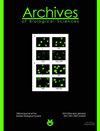Altered diversity of bacterial communities in two Drosophila species under laboratory conditions and lead exposure
IF 0.8
4区 生物学
Q4 BIOLOGY
引用次数: 3
Abstract
The composition of microbiota affects different traits of Drosophila throughout its life cycle and represents an important part of the adaptive response to environmental changes, such as increased levels of accumulated heavy metals in their habitats. We investigated the effects of lead added to the feeding substrate on the microbiota diversity in the fruit flies, Drosophila melanogaster and Drosophila subobscura. We compared the bacterial diversity of wild-caught flies and their progeny reared under standard laboratory conditions. We analyzed the shifts in bacterial diversity in the experimental groups of flies reared for 13 generations on standard and lead(II) acetate (Pb(CH3COO)2), Pb acetate-saturated substrates. Identification of the main bacterial genera was performed by next-generation sequencing (NGS) of the V3-V4 variable regions of the 16S rRNA gene. Results indicate significant species-specific differences in bacterial composition between natural and laboratory populations, and between the substrates. Diversity increased in both species under prolonged exposure to lead-polluted substrate, suggesting a potential adaptive response to an environmental stress.实验室条件和铅暴露下两种果蝇细菌群落多样性的改变
微生物群的组成影响果蝇整个生命周期的不同特征,是对环境变化(如栖息地重金属积累水平增加)的适应性反应的重要组成部分。研究了在取食基质中添加铅对果蝇、黑腹果蝇(Drosophila melanogaster)和亚果蝇(Drosophila subbobscura)微生物群多样性的影响。我们比较了野生捕获的苍蝇和它们在标准实验室条件下饲养的后代的细菌多样性。我们分析了在标准、醋酸铅(II) (Pb(CH3COO)2)、醋酸铅饱和底物上饲养13代的试验组蝇的细菌多样性变化。采用16S rRNA基因V3-V4可变区新一代测序(NGS)对主要细菌属进行鉴定。结果表明,在自然种群和实验室种群之间以及在基质之间,细菌组成存在显著的物种特异性差异。在长时间暴露于铅污染的基质下,这两种物种的多样性都有所增加,表明它们对环境胁迫有潜在的适应性反应。
本文章由计算机程序翻译,如有差异,请以英文原文为准。
求助全文
约1分钟内获得全文
求助全文
来源期刊
CiteScore
1.40
自引率
0.00%
发文量
25
审稿时长
3-8 weeks
期刊介绍:
The Archives of Biological Sciences is a multidisciplinary journal that covers original research in a wide range of subjects in life science, including biology, ecology, human biology and biomedical research.
The Archives of Biological Sciences features articles in genetics, botany and zoology (including higher and lower terrestrial and aquatic plants and animals, prokaryote biology, algology, mycology, entomology, etc.); biological systematics; evolution; biochemistry, molecular and cell biology, including all aspects of normal cell functioning, from embryonic to differentiated tissues and in different pathological states; physiology, including chronobiology, thermal biology, cryobiology; radiobiology; neurobiology; immunology, including human immunology; human biology, including the biological basis of specific human pathologies and disease management.

 求助内容:
求助内容: 应助结果提醒方式:
应助结果提醒方式:


